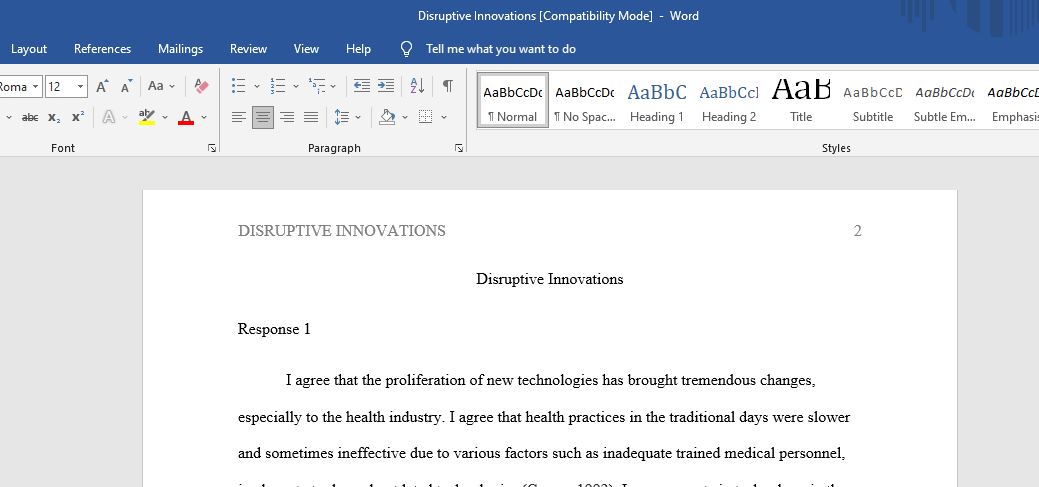Responses concerning disruptive innovations.
When it comes to being a provider, there is an array of skill sets that they must process to be acknowledged as providers. The healthcare industry is full of disruptive innovations that have corrupted the needed skillsets to be a provider. A person must possess the skills of being able to talk to people. Also, to better communicate with a person to be able to figure out what is wrong with them when they come to a healthcare environment due to any problem presented to them to be an issue. Due to the disruptive innovation of technology, a great deal of provides lacks the skill set of being able to communicate due to the amount of technology that has advanced with science. It has dehumanized a healthcare visit. Science has taken over “If science becomes all technique and technology, it quickly degenerates into man against humanity” (Convey, 1992, p91). A healthcare professional no longer must come into the room and physically exam a patient to build a doctor-patient relationship. This has been disrupted because a doctor can now complete a full review of the person due to the number of questions that have been asked before the said exam; with just a push of a button, a full workup of the person can be generated by a computer. The doctor only must come into the room and look over a few documents with just a push of a few buttons, and the visit is complete. The doctors can treat the symptoms that a patient is exhibiting, and this demolished the skill sets that are needed to provide care to patients accurately. The world has become enslaved to technology “All things are lawful for me,” but not all things are helpful. “All things are lawful for me,” but I will not be enslaved by anything” (1 Corinthians 6:12 NIV).
References
The Holy Bible NIV
Covey, S. (1992). Principle-centered leadership. Los Angeles, CA: Fireside Press.
100 word reply either agreeing disagreeing or relating to.
Good morning class. Many leaders have noticed the need for change. In the past, specific processes and procedures were performed at a slower pace. This action could’ve been for multiple reasons, including lack of technology, lack of equipment, low personnel, etc. Regardless of the situation, the health and needs of people need attention. With the population steadily growing, this situation needed attention immediately. The creation of technology such as computers (to assist with the admission process and track patients), new medications, and different business models (urgent care, retail clinics, surgery centers, etc.) improved the healthcare process tremendously. More new creations were intended to solve more of the many health issues that Americans face today. However, is the efficiency and effectiveness of the original nature up to par? Modern technology consists of fetal monitors, MRI mammograms, CT scans for screening, new drugs, and cardiac surgeries. The issue with these new medications and unique creations is that this new equipment is costly. There are other issues, such as taking away from others or the normal process. Laser eye surgery is an example. In the past, laser eye surgery was performed at a hospital. Now, they are usually performed at an outpatient eye surgery center. New eye surgery centers require less skill than one would at the hospital. Even though it isn’t realized initially, sometimes other organizations should add value. By not having to perform laser eye surgery at the hospital, there are other aspects that professionals can focus on. With this change, leaders have to possess the ability to adapt. The Bible states, “Do not be conformed to this world, but be transformed by the renewal of your mind, that by testing you may discern what is the will of God, what is good and acceptable and perfect” (Romans 12:2, New King James Version).
References
The Holy Bible 100 word reply either agreeing disagreeing or relating to

